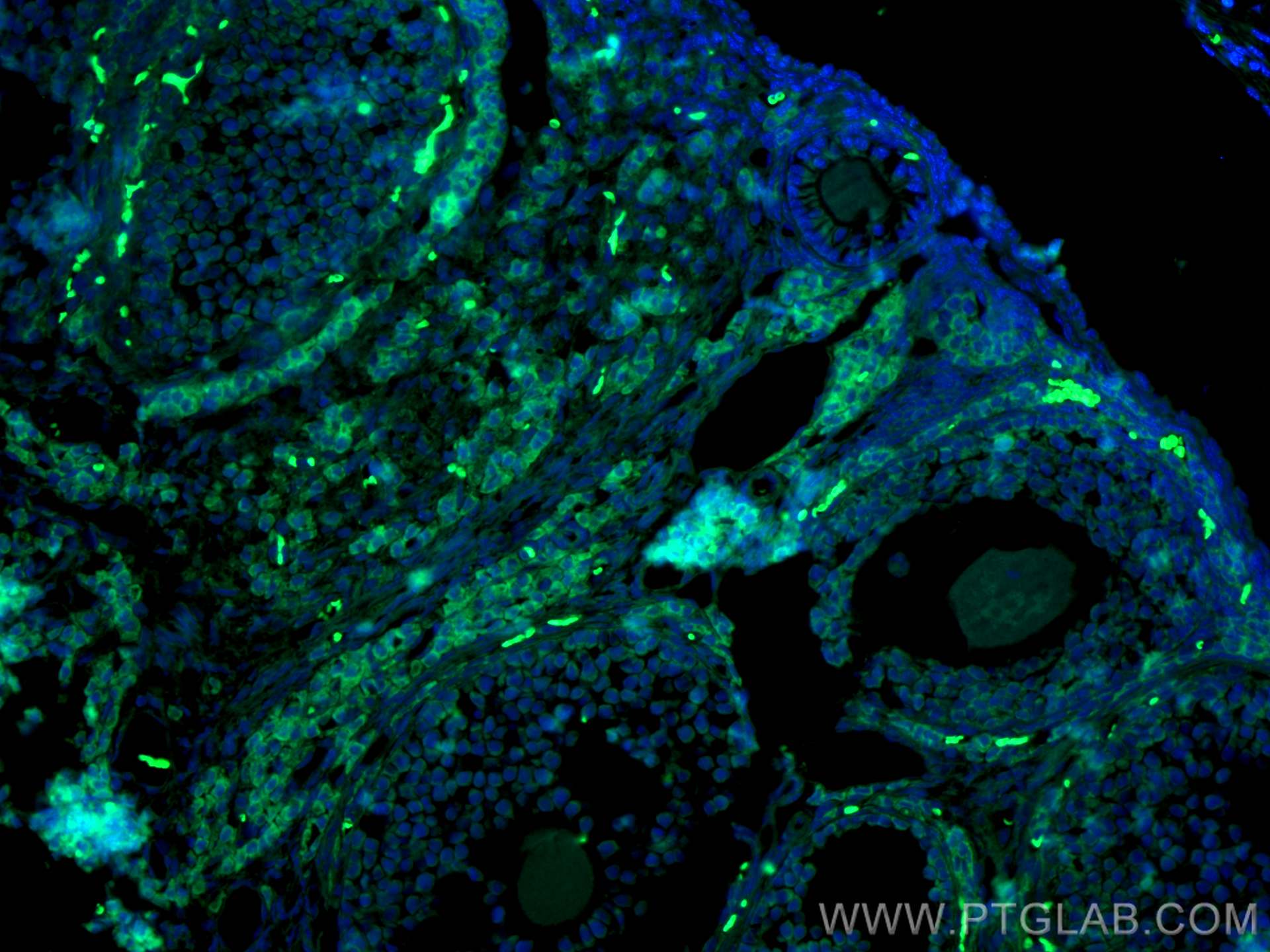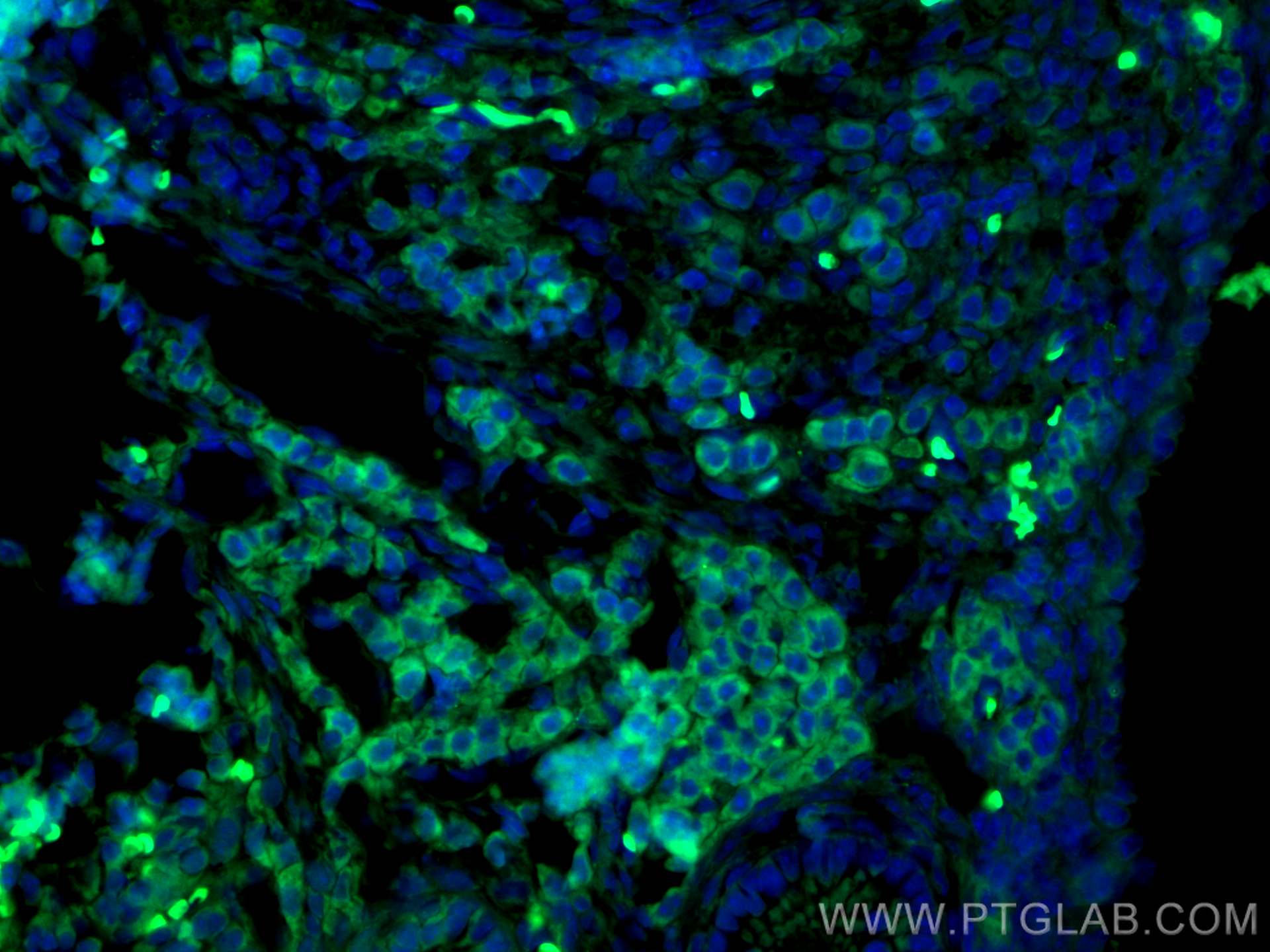Tested Applications
| Positive IF-P detected in | mouse ovary tissue |
Recommended dilution
| Application | Dilution |
|---|---|
| Immunofluorescence (IF)-P | IF-P : 1:50-1:500 |
| It is recommended that this reagent should be titrated in each testing system to obtain optimal results. | |
| Sample-dependent, Check data in validation data gallery. | |
Product Information
CL488-23479 targets AMH in IF-P applications and shows reactivity with human, rat, mouse samples.
| Tested Reactivity | human, rat, mouse |
| Host / Isotype | Rabbit / IgG |
| Class | Polyclonal |
| Type | Antibody |
| Immunogen |
CatNo: Ag20166 Product name: Recombinant human AMH protein Source: e coli.-derived, PET28a Tag: 6*His Domain: 1-560 aa of BC049194 Sequence: MRDLPLTSLALVLSALGALLGTEALRAEEPAVGTSGLIFREDLDWPPGSPQEPLCLVALGGDSNGSSSPLRVVGALSAYEQAFLGAVQRARWGPRDLATFGVCNTGDRQAALPSLRRLGAWLRDPGGQRLVVLHLEEVTWEPTPSLRFQEPPPGGAGPPELALLVLYPGPGPEVTVTRAGLPGAQSLCPSRDTRYLVLAVDRPAGAWRGSGLALTLQPRGEDSRLSTARLQALLFGDDHRCFTRMTPALLLLPRSEPAPLPAHGQLDTVPFPPPRPSAELEESPPSADPFLETLTRLVRALRVPPARASAPRLALDPDALAGFPQGLVNLSDPAALERLLDGEEPLLLLLRPTAATTGDPAPLHDPTSAPWATALARRVAAELQAAAAELRSLPGLPPATAPLLARLLALCPGGPGGLGDPLRALLLLKALQGLRVEWRGRDPRGPGRAQRSAGATAADGPCALRELSVDLRAERSVLIPETYQANNCQGVCGWPQSDRNPRYGNHVVLLLKMQARGAALARPPCCVPTAYAGKLLISLSEERISAHHVPNMVATECGCR Predict reactive species |
| Full Name | anti-Mullerian hormone |
| Calculated Molecular Weight | 59 kDa |
| GenBank Accession Number | BC049194 |
| Gene Symbol | AMH |
| Gene ID (NCBI) | 268 |
| RRID | AB_3084075 |
| Conjugate | CoraLite® Plus 488 Fluorescent Dye |
| Excitation/Emission Maxima Wavelengths | 493 nm / 522 nm |
| Form | Liquid |
| Purification Method | Antigen affinity purification |
| UNIPROT ID | P03971 |
| Storage Buffer | PBS with 50% glycerol, 0.05% Proclin300, 0.5% BSA, pH 7.3. |
| Storage Conditions | Store at -20°C. Avoid exposure to light. Stable for one year after shipment. Aliquoting is unnecessary for -20oC storage. |
Background Information
Anti-Müllerian hormone (AMH), also called Müllerian-inhibiting substance (MIS), is a dimeric glycoprotein and a member of the TGF-β family. AMH, produced by the Sertoli cells of the fetal testis, induces the regression of the Müllerian ducts, the anlagen of the female reproductive tract. However, after birth, this sex-dimorphic expression pattern is lost and AMH is also expressed in granulosa cells of growing follicles in the ovary. More recently, AMH has been studied for its role in ovarian folliculogenesis and as a potential marker of ovarian reserve.
Protocols
| Product Specific Protocols | |
|---|---|
| IF protocol for CL Plus 488 AMH antibody CL488-23479 | Download protocol |
| Standard Protocols | |
|---|---|
| Click here to view our Standard Protocols |






